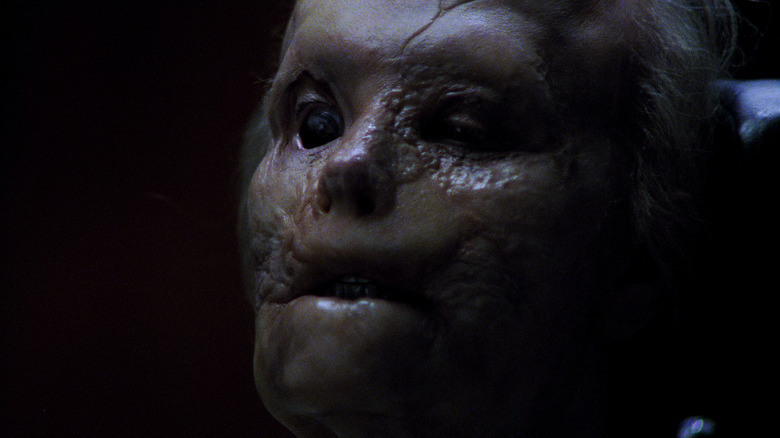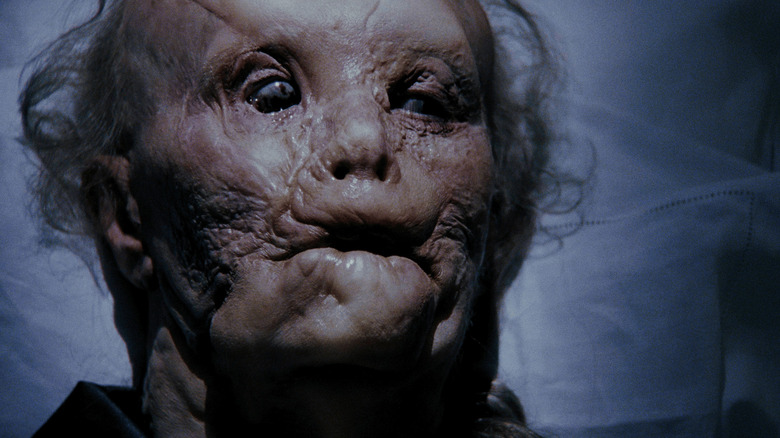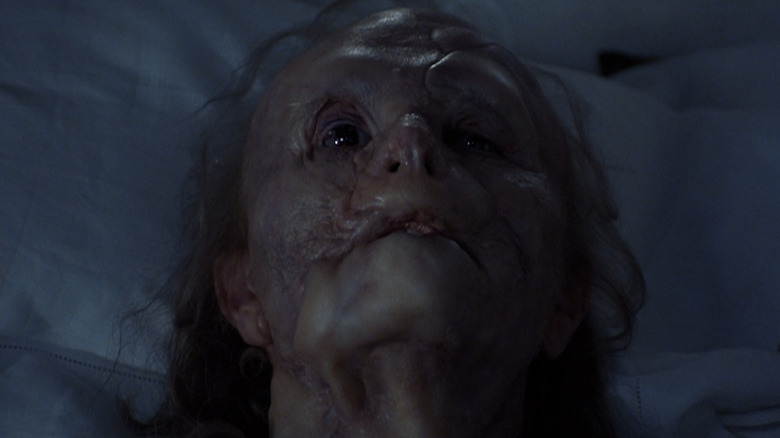Gary Oldman Wasn't Credited For His Work In A Ridley Scott-Directed Horror Movie
Ridley Scott's 2001 horror thriller "Hannibal" was a long-in-the-tooth sequel to "The Silence of the Lambs," both of them based on the works of author Thomas Harris. "Silence of the Lambs" was a boffo blockbuster when it came out in 1991, winning many Oscars and making millions. Anthony Hopkins took the world by storm with his lip-smacking performance as Dr. Hannibal Lecter, a brilliant psychiatrist with a penchant for mutilating, killing, and often eating his victims. At the end of "Lambs," Hannibal escapes his high-security prison and proceeds to wreak havoc in the world.
In "Hannibal," however, we learn that Dr. Lecter left one of his victims alive. Mason Verger (Gary Oldman) was a child stalker who, years ago, fell into Lecter's psychiatric care. Lecter, being a brilliant manipulator of minds, convinced Mason to use his autoerotic asphyxiation noose while slicing off his own face and feeding it to nearby dogs. Years later, Mason is paralyzed and defaced but has amassed a great deal of wealth behind the scenes. He is now using his political influence and control of the FBI to draw Lecter out of hiding and get his revenge. Mason's revenge involves a pack of wild pigs trained to eat human flesh.
There is a flashback sequence wherein audiences can see Oldman's face clearly, but for the bulk of the film, Mason Verger is scarred beyond recognition. One would be forgiven for not knowing it was Oldman under the makeup, as the prosthetic technicians did an amazing job.
The issue would also be muddied by the fact that Oldman's name was absent from the credits upon the initial release of "Hannibal." For the film's home video release, Oldman's credit was restored, but for a while, it seemed that the actor wanted to go uncredited. The truth about Oldman's credit is also difficult to determine, as the actor and the film's producer, Martha De Laurentiis, give different accounts of the matter. De Laurentiis said there was bad blood in an interview with the Guardian. Oldman, however, Talking to IGN in 2012, said the reason for the missing credit was more playful.
Martha De Laurentiis' story
Martha De Laurentiis recalled when director Ridley Scott cast Gary Oldman, and how the actor was insistent that he be given the top credit. This, of course, wasn't possible in a movie called "Hannibal" which featured the return of characters Hannibal Lecter and his nemesis, FBI Agent Clarice Starling, played by Julianne Moore. There was, it seems, a minor conflict over Oldman's credit, as De Laurentiis said:
"We had a funny situation with Gary. He wanted a prominent credit. Now, how can you do a prominent credit with 'Hannibal?' The characters are Hannibal and Clarice Starling. So we really couldn't work something out [at first]."
It seems that Oldman, when he wasn't given top billing, walked away from the project. He then almost immediately returned with a better idea: he wanted to go unbilled entirely. He presumably preferred to be anonymous, offering his fans a little surprise on opening day. But then, even with the new stipulation of anonymity in place, Oldman's casting was still made public knowledge. Primary producer Dino De Laurentiis announced the day before shooting was to begin that Oldman was to play Mason Verger. Oldman, Martha recalls, was very unhappy. Martha said:
"[Thanks to Dino's announcement] we couldn't deny that he was in the movie. [Oldman] got really pissed off. And to have a pissed-off actor ... You'll have to see the film to see if it's Gary Oldman or not."
Of course, Oldman was in it, and a mass audience knew. Oldman wasn't top-billed or unbilled. He merely appeared. But why did Oldman choose to appear unbilled? He revealed that in the 2012 interview with IGN.
Oldman's story
Goldman was asked point-blank by the IGN interviewer, Helen Keier, why he decided to go unbilled. Oldman didn't mention his desire to be top-billed, nor did he corroborate Martha De Laurentiis' story about his leaving the project briefly over the dispute. Instead, Oldman insisted his billing was a cute little prank. He wanted his unbilled performance to reflect on his range as an actor, saying:
"Yeah, we thought that as I'm unofficially the man of many faces, you know, of Lee Harvey Oswald, Dracula, and Sid Vicious, and Beethoven, we thought that I would be ... I'm playing the man with no face. So we just had a bit of fun with it. We thought it would be great. The man with no face and no name, and sort of do it anonymously. It's no secret that I'm in the film. We just had fun with it, really."
Oldman played Lee Harvey Oswald in Oliver Stone's "JFK," Dracula in Francis Ford Coppola's "Bram Stoker's Dracula," Sid Vicious in Alex Cox's "Sid and Nancy," and Beethoven in Bernard Rose's "Immortal Beloved."
It's possible that Oldman didn't mention the credits conflict because, by 2012, it was a nonissue. Everyone knew he was in the film, and the cat was out of the bag. Many years had passed, and nothing about "Hannibal" was remotely obscure. Indeed, by 2012, Lecter returned in the prequel film "Red Dragon," and in the prequel-prequel "Hannibal Rising." In February 2012, Bryan Fuller's TV series "Hannibal" had debuted, so there was no need to be coy about a Hannibal Lecter movie from 11 years prior any longer.
Oldman is in "Hannibal," and now he is in the credits.


